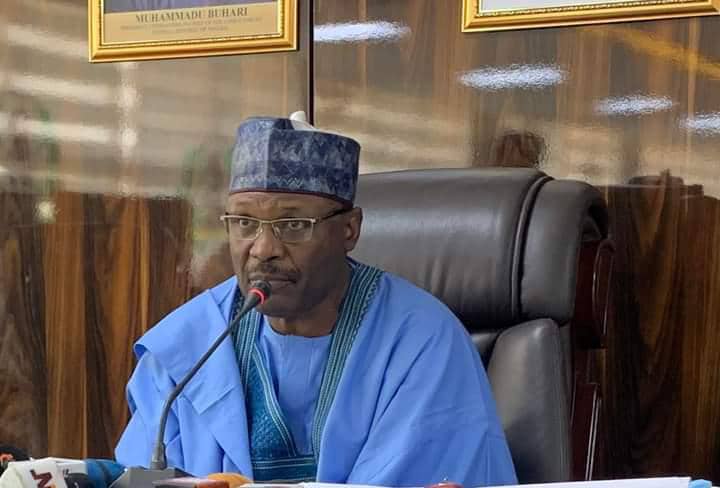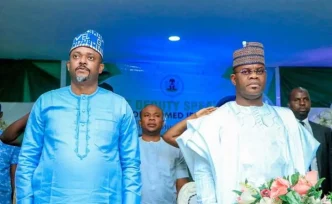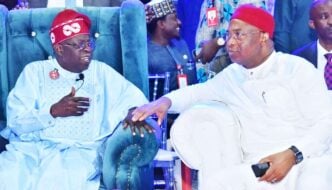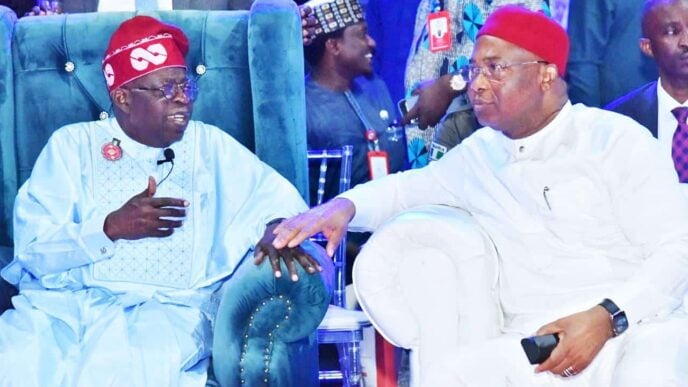In the last few days, there has been a sudden frenzy around who becomes the next chairman of Nigeria’s electoral body, INEC. This hysteria, which may be well intended in some quarters, has become another weapon of politics for those whose stock in trade is to exploit every national debate for political mileage.
I typically do not worry when I see people try to outmanoeuvre each other in politics; that is the nature of the game. But there is an emerging pattern that has become even more disturbing. That pattern first emerged with the economic reforms of the current government, where people who knocked the reforms were the same people who had either pledged the same commitment in the past or could not say anything tangible that they would do differently. The same pattern emerged during the tax reform bill, where people made it a ‘we vs them’ duel, giving it an ethnic dimension. We are now, once again, seeing the same pattern emerge with the appointment of the next INEC chairman. At the heart of this dangerous pattern is the weaponisation of fake news as an art form to spread fear, cause panic and mislead the public.
In principle, I believe that every Nigerian should be interested in who becomes the next chairman of INEC; moreover, as someone who has dedicated a major part of my time to advocating for electoral reforms, I am absolutely certain that this is evidently a settled matter. But raising the political temperature on such a critical issue does not help anyone. This is the sort of conversation that I believe should be beyond the remit of politics and should instead evoke a sense of patriotism and commitment to the truth.
In the last week, at least two patterns have supported this observation. The first one is from media scholar Prof. Farooq Kperoogi, who first spotlighted Justice Mohammed Abdullahi Liman, a retired judge, as a potential replacement for Prof. Mahmood Yakubu. In his notes from Atlanta, Kperoogi, who admitted he did not know enough about Liman to make a categorical comment, went on to describe him as a loadstone for controversies and attempted to support it with reports that were either inaccurate or deliberately concocted. I will return to some of these wild claims shortly.
Advertisement
The second one is a report from Sahara Reporters, titled ‘Tinubu Directs INEC Chairman Yakubu to Immediately Proceed on Leave For “Betraying APC”, Set to Nominate Successor’. In the said report published on September 24, the author made a poor attempt at fiction by claiming, of its own imagination, that Prof. Yakubu has been asked to go on compulsory leave and that therefore this may be an attempt to force out the INEC chairman, whose end of tenure is just about a month away. I will also return to this shortly. But it is worth noting that these two publications were made within days of each other. Striking.
But what are the main issues here? Sections 154(1) and 153(1) establish the power of the President to appoint the Chairman of INEC and the heads of other similar agencies. There has never been a time in the history of Nigeria where whoever was president that attempted to exercise these powers did not face a pushback. For the simple reason that the President has the constitutional right to appoint anyone at his own discretion, and because in some cases the appointed INEC Chairman could potentially preside over an election where the same president is also a candidate.
Some have argued that this power may limit the ability of whoever is the chairman of INEC to function with autonomy and independence. But this debate is not new; it has been on since 2007, when the Justice Uwais-led committee recommended that the power to appoint the INEC chairman be transferred from the president to the National Judicial Council (NJC). However, that recommendation, till today, is yet to undergo any legislative process. Therefore, anyone who is interested in this amendment should be looking to engage the NationalAssembly.
Advertisement
It is with the same token that I find it uncharitable that anyone would suggest that the government may be trying to force out the outgoing chairman. Prof. Mahmood Yakubu was first announced as INEC Chairman on October 21, 2015, before he was confirmed on October 29, 2015. He completed his first term in November 2020 and was renominated and confirmed for a second term in December 2020.
The constitution allows a two-term limit of a maximum of 10 years for anyone serving as INEC Chairman. In November, Prof. Yakubu would have served out his tenure and would effectively be statute-barred from reappointment. If this is anything to go by, let’s assume, but not concede, that the INEC chairman was asked to proceed on leave; this, in my opinion, would be standard civil service procedure. But attempting to frame it in the manner that the author in the Sahara Reporters report has done is oversimplifying an issue that requires a lot more seriousness. For a moment, we can put jokes aside.
For all his faults, Prof. Yakubu, in the last ten years as INEC Chairman, worked together with civil society organisations to deliver Nigeria’s most consequential Electoral Reform Act in 2022. The landmark reforms in the electoral act opened a new chapter in our election management. Part of the gain is how we have managed to deepen our electoral process with the functionality of technology. From the IREV to BVAS, these are all examples of the modest gains we have recorded. As someone who held leadership positions, I am not one to dismiss any effort. For this, I say fare thee well, Prof. Yakubu.
It is not often that I find myself disappointed in Prof. Farouq Kperoogi. But in this particular instance, I found his judgement questionable. In the same article on INEC and Justice Liman, Prof. Kperoogi made several claims; one of them was specifically about a past judgement, where he claimed that Justice Liman stirred outrage when, in a corruption trial, “the principal defendant walked away with fines while his co-defendant got 20 years”.
Advertisement
The matter in this instance was the one involving a certain Michael Igbinedion and Patrick Eboigbodin of PML Nigeria Limited. The judge (Justice Liman) convicted Eboigbodin for money laundering on counts 50-59, while Igbinedion was convicted on counts 79-81. Igbinedion was sentenced to an option of N1 million fine on each of the three counts and, in default, two years imprisonment. While Eboigbodin was sentenced to two years in prison without an option of a fine.
I do not think that Prof. Kperoogi was expecting two people who were convicted on different counts to get the same judgement. The question, therefore, is where Prof. Kperoogi found the 20 years he amplified in his opinion. Was this an omission or deliberate misinformation? I would think that a scholar of his stature would know better than to mislead the public for whatever reason.
I have never met the judge from Nasarawa, but I would want to believe that if he were truly in the mind of the president for this position, one of the reasons he may be under consideration is because he is from North Central, which has in fact never recorded a chairman of INEC from the region. Moreover, as it stands today, there is no serious contender for the presidency in 2027 from North Central. Amidst all the desperate attempts to paint a picture of a bad judge, Justice Liman retired without blemish.
Everyone should be interested in who becomes the INEC Chairman, because the person carries with them the expectation of every Nigerian, who continues to demand accountability in our election management. But I also believe that those demands should be done with a commitment to the truth. That is the least we expect of those who insist on being seen as the voice of conscience.
Advertisement
Awogbenle, a Development and Public Policy Professional, writes from United Kingdom. He can be reached via [email protected].
Advertisement
Views expressed by contributors are strictly personal and not of TheCable.











